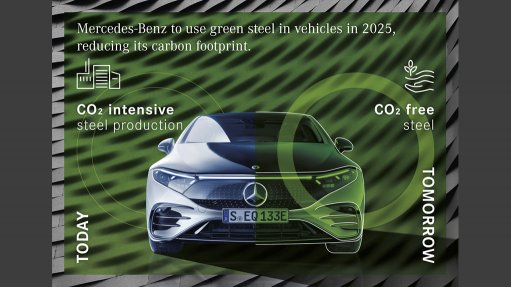
German car maker Mercedes-Benz has taken an equity stake in Swedish start-up H2 Green Steel (H2GS) as a method to introduce carbon-dioxide-free (CO2-free) steel into series production.
H2GS was founded in 2020 and aims to build a large-scale fossil-free steel production facility in northern Sweden. The company plans to produce five-million tons of fossil-free steel by 2030.
Together with its steel suppliers, Mercedes-Benz says it is ‘retooling’ its supply chain to focus on the prevention and reduction of CO2 emissions.
The partnership with HSGS is another step towards CO2 neutrality for Mercedes-Benz, which it says it is pursuing as part of Ambition 2039 – the goal to achieve a fully connected and CO2 neutral vehicle fleet in 2039, 11 years earlier than required by European Union legislation.
“With an equity stake in H2 Green Steel, Mercedes-Benz is sending an important signal to accelerate change in the steel industry and increase the availability of carbon-free steel,” says Markus Schäfer, member of the board of management of Daimler and Mercedes-Benz, responsible for Daimler group research, and also Mercedes-Benz Cars COO.
“As a first step, we are investing a single-digit million amount,” he notes.
“As a preferred partner of the start-up, we will be launching green steel in various vehicle models as early as 2025.”
A Mercedes‑Benz sedan is, for example, made from about 50% steel, which accounts for about 30% of CO2 emissions in production.
Steel produced using a classic blast furnace emits an average of more than two tons of CO2 a ton.
In a new green steel process, however, the supplier uses hydrogen and electricity from 100% renewable energy sources in steel production, instead of coking coal.
The hydrogen serves as a reduction gas, which releases and binds the oxygen from the iron-ore.
Unlike the use of coking coal, this does not produce CO2, but water.
The supplier also uses electricity from 100% renewable sources for the energy requirements generated in the manufacturing process.
Mercedes-Benz is a member of the Responsible Steel Initiative and is involved in the development of a certifiable sustainability standard for the steel industry.
The aim is to ensure environment-friendly and socially acceptable steel production along the entire value chain.
CO2 Neutral Supply Chain
Mercedes-Benz says it is pursuing the goal of a CO2-neutral new car fleet along the entire value and supply chain.
Suppliers representing more than 85% of Mercedes-Benz's annual purchasing volume have already signed a so-called ‘Ambition Letter’, agreeing to supply the company only with CO2-neutral products in the future.
This includes important steel suppliers.